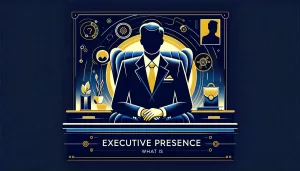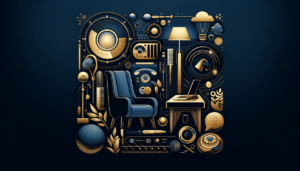In today’s competitive job market, interviews are the gateway to professional opportunities.
Whether you are looking for a job, clients, speaking engagements, or a board assignment, you will likely have to go through an interview.
It’s the moment when you can showcase your skills, experiences, and potential value.
However, for introverted professionals who may find self-presentation challenging, standing out and selling themselves effectively can be an uphill battle.
If you’re an introverted professional seeking to break through barriers, attract recognition, and secure the opportunities you deserve, you’re in the right place.
This article is tailored to empower you with valuable insights and strategies to excel in knowing how to sell yourself at an interview.
I understand the unique struggles introverted professionals face.
The desire to shine, make an impact, and attract professional opportunities may be hindered by the natural inclination towards introspection and a preference for quieter settings.
But fear not, for there are effective techniques and approaches that can help introverts stand out and authentically showcase their talents.
This article aims to equip you with the tools you need to navigate interviews with confidence and finesse.
I will delve into practical strategies, effective communication techniques, personal branding tactics, and ways to overcome common challenges introverted professionals encounter during the interview process.
Whether you’re considering investing in a personal branding coach or seeking self-guided solutions, this article aims to empower you on your journey to interview success.
Get ready to unlock your full potential, captivate interviewers, and sell yourself with authenticity and impact.
Let’s explore the art of selling yourself at an interview and pave the way to the professional opportunities you dream of.
Contents
- 1 Understanding the interview process
- 2 Identifying your unique value proposition
- 3 Crafting your personal brand story
- 4 Effective communication techniques
- 5 Showcasing your achievements and skills
- 6 Build rapport and connection to establish a lasting impression
- 7 Handling nervousness and stress to strive under pressure
- 8 Empower yourself to sell yourself at an interview!
Understanding the interview process
When it comes to standing out, getting recognition, and attracting professional opportunities, acing the interview is essential.
As an introverted professional seeking to make a lasting impression and sell yourself effectively, it’s crucial to understand the interview process inside out. By mastering the intricacies of interviews, you can confidently navigate any interview scenario and leave a lasting impact on potential employers.
At its core, an interview is a structured conversation between a candidate and an employer.
Its purpose is to evaluate your qualifications, skills, and fit for a specific role and the organization as a whole. By assessing your expertise, experience, and personality, employers aim to determine if you are the right candidate for the job.
Interviews can take various formats, each with its own unique characteristics and dynamics.
The most common formats include one-on-one, panel, and behavioral interviews.
- In a one-on-one interview, you’ll meet with a single interviewer, typically the hiring manager or team member.
- Panel interviews, on the other hand, involve facing a group of interviewers who collectively evaluate your suitability for the role.
- Behavioral interviews focus on assessing how you have responded to past situations and challenges, using your past behavior to indicate your future performance.
Regardless of the interview format, preparation is paramount.
Investing time in thorough research and preparation before stepping into the interview room (or virtual interview space) is essential.
Start by understanding the company, its mission, values, and culture. Delve into the job description and requirements, identifying the key skills and experiences the employer is seeking.
By aligning your own background and achievements with the role’s demands, you can effectively demonstrate why you are the perfect fit.
Researching the interviewers, if possible, can also provide valuable insights. Understanding their professional backgrounds and areas of expertise can help you tailor your responses and establish a connection during the interview.
Preparation isn’t limited to researching the company and role.
It also involves rehearsing responses to common interview questions, practicing your delivery, and anticipating potential challenges.
You’ll feel more confident and composed during the interview by preparing thoughtful and concise answers.
Remember, the more prepared you are, the more relaxed and focused you can be in showcasing your skills and qualifications.
Preparation allows your genuine abilities and unique qualities to shine through, helping you stand out from the competition and leave a memorable impression on potential employers.
Identifying your unique value proposition
When it comes to selling yourself at an interview, one of the most powerful tools in your arsenal is your unique value proposition.
As an introverted professional seeking to stand out, get recognition, and attract professional opportunities, it’s crucial to understand and articulate what sets you apart from other candidates.
By identifying your unique value proposition, you can confidently showcase your strengths, skills, and experiences in a way that resonates with potential employers.
To embark on this journey of self-discovery, start by engaging in self-reflection.
Take the time to introspect and understand your unique combination of qualities, experiences, and expertise. Reflect on your personal and professional accomplishments and the skills you have honed throughout your career.
What are the strengths and attributes that make you exceptional in your field? What are the experiences that have shaped you and contributed to your growth?
Consider the challenges you have overcome, the results you have achieved, and the positive impact you have made in previous roles.
These are all valuable components of your unique value proposition.
By recognizing and embracing your strengths and accomplishments, you can develop a strong sense of confidence and clarity about what you bring to the table.
To help identify your unique value proposition, consider the following questions:
- What are your core strengths and skills? What makes you exceptional in your field?
- What unique experiences or perspectives do you bring to the table?
- How have you made a positive impact in your previous roles?
- What sets you apart from other candidates with similar qualifications?
Engaging in exercises such as writing a personal brand statement, conducting a SWOT (Strengths, Weaknesses, Opportunities, Threats) analysis, or seeking feedback from trusted colleagues or mentors can also be helpful in uncovering and articulating your value proposition effectively.
Remember, your unique value proposition is not just about listing your qualifications and experiences; it’s about communicating how those qualities align with the needs and values of potential employers.
By understanding your unique value proposition, you can craft compelling narratives that highlight your strengths and demonstrate how you can contribute to the success of an organization.
Crafting your personal brand story
In today’s competitive job market, personal branding has become a crucial element in effectively selling yourself at an interview.
As an introverted professional seeking to stand out, get recognition, and attract professional opportunities, crafting a compelling personal brand story is key to leaving a lasting impression on interviewers.
At its core, personal branding is about intentionally shaping how others perceive you.
It involves identifying and communicating your unique value proposition, skills, experiences, and personal attributes that differentiate you from other candidates.
Your personal brand story is a narrative that weaves together these elements and showcases your professional journey in a way that resonates with interviewers.
To create a compelling personal brand story, reflect on your career trajectory, key accomplishments, and experiences that have shaped you.
You might also want to leverage proven storytelling principles when writing your professional story.
Consider the core values, passions, and motivations that drive you professionally. What is the story you want to tell? How do you want others to perceive you?
When crafting your personal brand story, keep these key elements in mind:
- Authenticity: Be true to yourself and your experiences. Highlight your genuine passion for your field and the work you do. Authenticity creates a connection with interviewers and helps them understand who you truly are.
- Relevance: Tailor your personal brand story to the specific job opportunity and the company’s values and culture. Showcase how your skills and experiences align with the needs and goals of the organization.
- Structure: Organize your personal brand story in a clear and compelling manner. Start with a captivating opening that grabs the interviewer’s attention. Then, take them on a journey through your career, highlighting key accomplishments, challenges you’ve overcome, and lessons you’ve learned.
- Accomplishments: Emphasize your most relevant and impactful accomplishments. Quantify your achievements whenever possible to provide tangible evidence of your capabilities.
- Passion: Communicate your genuine enthusiasm and passion for your work. Share stories that demonstrate your dedication, commitment, and drive.
Practice delivering your personal brand story to ensure it flows naturally and effectively during interviews.
Seek feedback from trusted colleagues, mentors, or a personal branding coach to refine and strengthen your narrative.
Effective communication techniques
In an interview, effective communication is essential for introverted professionals seeking to sell themselves and make a lasting impression.
It goes beyond just what you say; it encompasses both verbal and non-verbal aspects that convey confidence, professionalism, and authenticity.
First and foremost, active listening is a crucial communication skill to master.
Show genuine interest in what the interviewer says by maintaining good eye contact, nodding, and providing verbal cues to indicate your understanding.
Active listening not only helps you fully comprehend the questions being asked but also allows you to respond thoughtfully and demonstrate your engagement in the conversation.
Non-verbal communication plays a significant role in conveying confidence and professionalism.
Maintain good posture throughout the interview, as it projects self-assurance. Use open and welcoming body language, such as uncrossed arms and a relaxed demeanor.
These non-verbal cues demonstrate your approachability and willingness to connect with the interviewer.
When it comes to verbal communication, clear and concise responses are key.
Practice structuring your responses to questions by using the STAR method (Situation, Task, Action, Result) to provide a well-rounded and structured answer.
This technique helps you articulate your thoughts logically and organized, ensuring your points are delivered effectively.
Storytelling is another powerful communication tool that captivates interviewers and leaves a lasting impression.
Share anecdotes and examples from your professional experience to illustrate your skills, accomplishments, and problem-solving abilities.
Storytelling makes your responses more engaging and helps interviewers understand your capabilities in real-world scenarios.
Throughout the interview, be mindful of your tone of voice and pace of speech.
Speak clearly, confidently, and at a moderate pace to ensure your words are easily understood. Pay attention to your language, using professional terminology when appropriate and avoiding jargon that might confuse the interviewer.
Lastly, practice is key to honing your communication skills.
Conduct mock interviews with friends, family, or a personal branding coach to refine your delivery, receive feedback, and gain confidence in your ability to communicate effectively.
Showcasing your achievements and skills
One of the key challenges introverted professionals face in interviews is effectively presenting their achievements and skills.
It’s important to showcase your capabilities to demonstrate your value to potential employers. The STAR method (Situation, Task, Action, Result) is one powerful technique to achieve this.
When faced with behavioral questions that require you to provide examples of past experiences, the STAR technique can help you structure your responses clearly and effectively.
- Situation: Begin by describing the specific situation or challenge you encountered in a concise manner. Provide enough context to help the interviewer understand the circumstances you faced.
- Task: Clearly explain the task or goal you needed to accomplish within that situation. What were you expected to achieve or contribute?
- Action: Share the actions you took to address the situation. Focus on your specific role and highlight the skills or competencies you applied. Be sure to emphasize any unique approaches or innovative strategies you employed.
- Result: Conclude your response by outlining the results or outcomes of your actions. Quantify the impact whenever possible, such as increased revenue, cost savings, or improved efficiency. Discuss the positive outcomes you achieved and the benefits they brought to the organization or team.
By utilizing the STAR technique, you can provide a structured and comprehensive response that effectively highlights your achievements and skills.
This method demonstrates your abilities and helps interviewers envision how you would contribute to their organization.
To further enhance your ability to showcase your achievements and skills, consider practicing your responses to common interview questions using the STAR technique.
Reflect on your past experiences and identify relevant examples that demonstrate your expertise, problem-solving abilities, and contributions.
Practice delivering these responses confidently and concisely, ensuring that you capture the attention of interviewers and leave a memorable impression.
Build rapport and connection to establish a lasting impression
Building rapport and connection with your interviewers is essential for creating a positive and lasting impression.
You can enhance your chances of standing out and securing professional opportunities by fostering a genuine connection.
Here are some effective techniques to help you establish rapport and connection during interviews:
- Active Listening:
Show genuine interest in what the interviewer is saying by actively listening and providing thoughtful responses.
Demonstrate your attentiveness through non-verbal cues like maintaining eye contact and nodding to indicate understanding. You convey your respect and interest in the interviewer’s perspective by actively engaging in the conversation.
- Asking Insightful Questions:
Prepare a list of insightful questions to ask the interviewer.
These questions should demonstrate your curiosity and eagerness to learn and provide an opportunity for deeper engagement. You showcase your interest and dedication by asking thoughtful questions about the company, its culture, or the role you’re interviewing for.
- Finding Common Ground:
Prior to the interview, conduct thorough research on the company and interviewers.
Look for shared interests, common experiences, or industry-related topics that you can discuss during the conversation. Finding common ground helps create a connection and establishes a sense of rapport.
It also demonstrates that you’ve taken the time to understand the company and its employees.
Establishing a connection requires both sincerity and preparation. It’s important to strike a balance between being authentic and demonstrating your knowledge and interest in the organization.
Building rapport and connection with your interviewers can leave a lasting impression that sets you apart from other candidates.
Handling nervousness and stress to strive under pressure
Interviews can be nerve-wracking for introverted professionals who may struggle with managing nervousness and stress.
However, with the right techniques and strategies, you can navigate these challenges and present yourself confidently.
Here are some valuable tips to help you handle nervousness and stress during interviews:
- Acknowledge and Normalize Nervousness:
Remember that feeling nervous before an interview is natural and experienced by many candidates.
Instead of letting it overwhelm you, acknowledge and normalize your nervousness. Recognize that it’s a sign of your dedication and desire to perform well. Embrace your nervous energy and channel it into enthusiasm and determination.
- Relaxation and Mindfulness Techniques:
Prior to the interview, practice relaxation and mindfulness techniques to calm your mind and body.
Deep breathing exercises, progressive muscle relaxation, and visualization can help reduce anxiety and promote a sense of calm. Find a quiet space where you can relax and focus on your breathing, allowing yourself to let go of tension and stress.
- Positive Self-Talk:
Replace negative self-talk with positive affirmations and encouraging statements.
Remind yourself of your strengths, achievements, and the value you bring to the table. Visualize yourself succeeding in the interview and performing at your best. By reframing your thoughts in a positive manner, you can boost your confidence and alleviate stress.
- Recharging and Preparation:
Introverts often need time alone to recharge and regain energy.
Prioritize self-care before the interview by engaging in activities that help you relax and feel centered. Whether it’s reading a book, going for a walk, or practicing a hobby, find what works best for you to recharge and enter the interview with a refreshed mindset.
Additionally, thorough preparation and mock interviews can boost your confidence and reduce stress.
Remember, feeling nervous is normal, especially in high-stakes situations like interviews.
The key is to channel your nervous energy into positive enthusiasm and leverage techniques that help you relax and prepare.
You can present yourself authentically and confidently during the interview by acknowledging and addressing your nervousness.
Empower yourself to sell yourself at an interview!
Mastering the art of selling yourself at an interview is a critical skill for introverted professionals who are seeking to stand out, gain recognition, and attract professional opportunities.
Throughout this article, we’ve explored various strategies and insights tailored specifically to the needs of introverts in the interview process.
As introverted professionals, it’s important to remember that your unique qualities and strengths can be powerful assets in the interview process.
Embrace your natural inclination towards reflection and preparation, and leverage your ability to listen attentively and think deeply.
By embracing your authentic self and confidently presenting your value proposition, you have the ability to stand out and make a lasting impression.
Now, armed with the knowledge and insights gained from this article, it’s time to take action.
Invest in your personal branding, practice your interview techniques, and seek opportunities to showcase your abilities.
Interview success is not just about selling yourself; it’s about being true to who you are and demonstrating how you can make a meaningful impact.
If you’re ready to take your interview skills to the next level, consider contacting a personal branding coach.
They can provide personalized guidance and support as you navigate the interview process and help you unlock your full potential.
Thank you for joining me on this journey toward interview success.
May your next interview be an opportunity for you to shine and secure the professional opportunities you deserve.





